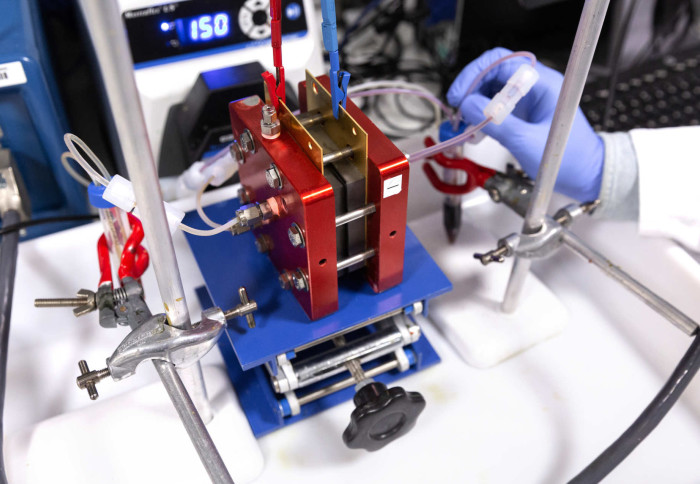Two Imperial engineers win European grants for pioneering research

Two Imperial engineers have won European Research Council Proof of Concept grants for their pioneering research.
Dr Qilei Song from the Department of Chemical Engineering is aiming to scale-up new technology for redox flow batteries and Professor Deniz Gündüz from the Department of Electrical and Electronic Engineering is aiming to revolutionize video transmission.
Dr Qilei Song, Chemical Engineering – Redox Flow Batteries
"“To accelerate the development of renewable energy we need to develop large scale energy storage technologies." Dr Qilei Song Department of Chemical Engineering
Electrochemical energy storage and conversion technologies play a significant role in the storage of energy produced by renewables such as wind and solar, as well as in the generation and utilisation of clean energy carriers, such as hydrogen.
A typical flow battery consists of two tanks of electrolytes which are pumped past a membrane held between two electrodes. The membrane separator allows ions to transport between the tanks while preventing the cross-mixing of the electrolyte solutions.
One of the current challenges for industry is designing, developing and manufacturing the membranes for these batteries in a cost-effective and environmentally sustainable way, while ensuring the efficiency of the batteries. In fact, the membranes in some cases make up to 40% of the cost of the batteries.
Large scale energy storage technologies

Dr Qilei Song, a Senior Lecturer (Associate Professor) in the Department of Chemical Engineering, will use the funding to develop new ion-selective membranes, enabling more efficient batteries, and will explore potential pathways to commercialise the technology.
Dr Song said: “To accelerate the development of renewable energy we need to develop large scale energy storage technologies. This project is great recognition of my team’s efforts, despite the disruption of the pandemic, and it will support us to move forward to further develop the technologies and explore the potential of commercialisation.”

In 2019, Dr Song won a €1.5 Million ERC Starting grant, which the team used to develop highly conductive and selective membranes and successfully demonstrated their promising performance in lab-scale flow battery cells.
Now this new proof-of-concept grant award – worth €150,000 over 18 months – will support them to scale up the synthesis and manufacturing of polymer membranes, verify their feasibility in relatively large battery stacks and explore potential for use in industry.
Dr Song added: “Redox flow batteries are a promising method for large scale energy storage – such as storing energy from renewable sources and integrating it into power grids.
“However, the existing systems we use to do this in flow batteries are usually expensive, and their manufacturing can also cause environmental pollution. My new proof-of-concept grant aims to address this big question by developing low-cost membranes that provide better performance, and can be manufactured more sustainably.”
Dr Anqi Wang, a postdoctoral researcher on the team, has been working on the development of innovative flow battery membranes, which have been supported by the ERC Starting Grant throughout both his PhD and postdoctoral research. Dr Wang will be involved in the scaling up and manufacturing of the membranes.
The team are collaborating with academics at the University of Edinburgh, University of York and Swansea University, as well as industry partners in the UK and Europe.
Professor Deniz Gündüz, Electrical and Electronic Engineering – Wireless video delivery

Professor Deniz Gündüz, from the Department of Electrical and Electronic Engineering, aims to revolutionise video transmission by using deep learning to improve video quality.
Typically when transmitting wireless video such as video calling on a mobile device, the video is compressed into ‘bits’ which are then transmitted over a wireless channel using error correction coding – a form of binary messages. This method protects against signal interference but often sees a reduction in quality.
However, Professor Gündüz and his team have created an architecture that is more similar to analog transmission and aims to outperform current methods in both performance and speed.

Professor Gündüz explains: “DeepWiVe uses deep learning to transmit videos over wireless channels without employing any explicit compression or channel coding, more similarly to analog communication. This could herald benefits to many applications such as video conferencing and satellite imaging. The potential social and economic impact of this technology is tremendous considering our society’s increasing dependence on mobile multimedia communication.”
This is the third European Research Council grant that Professor Gündüz has won including a Consolidator Grant last year.
This new project, DeepWiVe, builds on previous grant ERC BEACON and aims to outperform current state-of-the-art techniques for transmitting video.
Professor Gündüz added: “ERC grants are the most competitive and prestigious research grants in Europe. Winning three ERC grants not only provides generous funding for my group but also serves as a recognition of the excellence and potential impact of our research. However, it also entails great responsibility to ensure that we put these valuable public resources to the best use possible for the benefit of society.”
Article supporters
Article text (excluding photos or graphics) © Imperial College London.
Photos and graphics subject to third party copyright used with permission or © Imperial College London.
Reporter
Stephen Johns
Communications Division